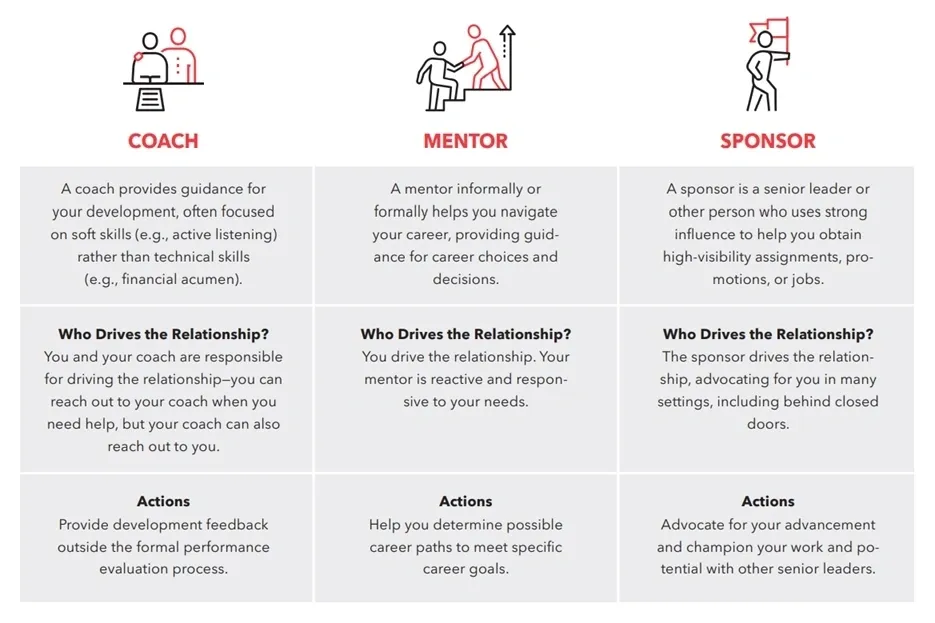Mentors, sponsors, and coaches are vital for your professional development. Each of them brings special strengths and attributes to your cause.
While you have heard about all of them, and probably even built relationships with some, can you clearly distinguish who is who?
The differences between a mentor, coach, or sponsor can seem hard to define, but in fact they all have different roles. It is crucial to know what you need before you ask for their assistance.
In our opinion, the most appealing description of the difference is:
“A coach talks to you, a mentor talks with you, and a sponsor talks about you.”
(Catalyst. Coaches, Mentors, and Sponsors: Understanding the Differences. New York: Catalyst, December 11, 2014.)
Let’s look at these roles in-depth and self-reflect: whom do you need most at your current career-development stage?
Mentor
Mentors advise. They give valuable advice, build your self-esteem, and help you when you are not sure about your next steps in this or that domain.
Mentors can be from anywhere and they can be of any age. The more diverse mentorship relationships you have in your life, the better.
Usually mentoring relationships develop naturally. Mostly because the mentor likes your personality and there are some similarities between the two of you (which is not actually always good for effective mentorship). Mentors enjoy sharing their experience with you and being a sounding board when you come up with a challenging work/life situation. They help you navigate your waters through the prism of their knowledge, experience, and expertise.
They are not your ticket to the top of your career though.

Illustration by Catt Small
Sponsor
A sponsor acts. They believe in your value because this brings value to them.
Sylvia Ann Hewlett, author of Forget a Mentor, Find a Sponsor, writes about the three primary responsibilities of a sponsor: to believe in and go out on a limb for you; to use their organizational capital, both publicly and behind closed doors, to push for your promotion; and to provide you with “air cover” for risk-taking.
Sponsors promote you directly, using influencing power and networking to connect you with good jobs, the right people, and special assignments.
A sponsor takes an interest in your career not out of altruism or like-mindedness but because this is an investment in their own career, organization, or vision. Sponsorship done right is transactional.

Coach
Coaches coach. They help you excel by observing how you perform specific tasks and offering constructive criticism for achieving better results. Coaches help improve performance related to a particular issue, and their service is usually paid. Relationships with coaches are usually defined by a specific goal that has been set up by the coachee. A coach holds you to account and pushes you out of your comfort zone; stretches you, but in a way that makes you feel comfortable with discomfort.

Case Study
To make the distinction even more clear, let’s look at Elizabeth.
Elizabeth works for a marketing company. She successfully progressed thorough a couple of positions and achieved the role of department manager. After her director made the decision to move to another company, Elizabeth seized the opportunity and asked to be promoted. To her surprise, her request was denied, and the position was offered to her colleague from another department. To her even bigger surprise, Elizabeth discovered that her former director, whom she had considered to be her mentor for years, was a key person in identifying and recommending the right person for the position.
Elizabeth called her former director and asked for a transparent one-on-one conversation, so she could better understands why the situation developed that way. The director explained that he never knew Elizabeth was interested in his role; moreover, she constantly stated that she was happy with what she was doing. He also reminded Elizabeth that she never asked for advice on how to avoid conflicts, and he believes that conflict management is an absolutely crucial skill for the role. Recommending someone who lacks that skill would damage the director’s professional brand, which he would never do.
As you can see from Elizabeth’s case, there is a clear misunderstanding of the mentor’s role. Elizabeth expected her mentor to advocate for her in front of the executive leadership team. Instead, she should have clearly communicated her interest in advancement within the organization to her former director and asked him for sponsorship. She had every chance of him saying yes, as they had a good professional relationship. At that point, they could have found a coach to help Elizabeth develop conflict-resolution skills and get her ready to transition to the new role when time came.
Self-Reflection Time
Consider challenges that you have been facing on your career path and everything that you have just read, then reflect. Whom do you need? Mentor, sponsor, or coach? Two? All three?
Who has already been impacting your life?
Do you leverage your relationship with this person in the right way?
Reach out to us and ask for a “Mentor, Sponsor, Coach — Leveraging Relationships for Better Performance Results” session.
We will help you to discover:
- What you need to do to attract the right sponsors, win their advocacy, and sustain their interest
- How to leverage relationship with your mentors in the right way
- Whether you need any coaching to help you develop a new skill, perform better, and advance in your career
Together, we will also co-create a road map that will put you in the position of the leader in your relationship with these key people.
Shape your professional development based on your choices. Knowing what you need is the first step; finding the right person is the second.
Be mindful of the energy that you spend.

